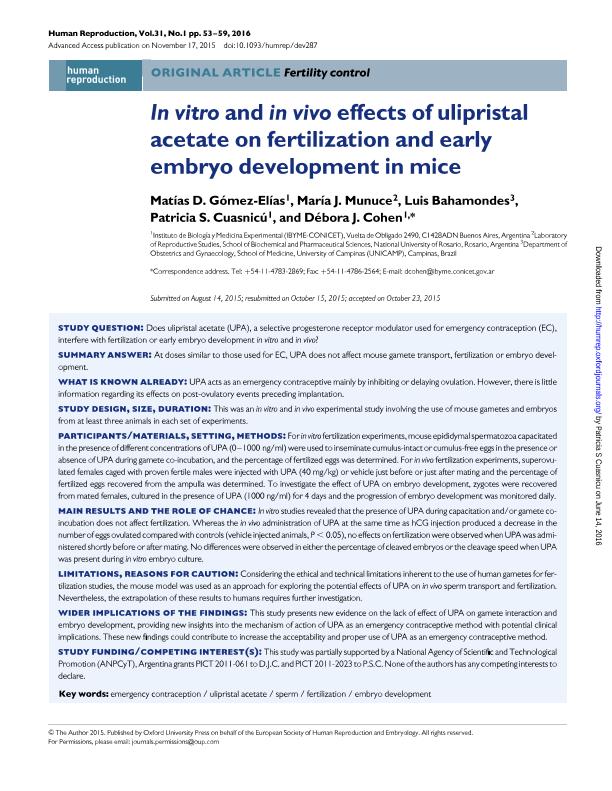Artículo
In vitro and in vivo effects of ulipristal acetate on fertilization and early embryo development in mice
Gómez Elías, Matías Daniel ; Munuce, María José; Bahamondes, Luis; Cuasnicu, Patricia Sara
; Munuce, María José; Bahamondes, Luis; Cuasnicu, Patricia Sara ; Cohen, Debora Juana
; Cohen, Debora Juana
 ; Munuce, María José; Bahamondes, Luis; Cuasnicu, Patricia Sara
; Munuce, María José; Bahamondes, Luis; Cuasnicu, Patricia Sara ; Cohen, Debora Juana
; Cohen, Debora Juana
Fecha de publicación:
01/2016
Editorial:
Oxford University Press
Revista:
Human Reproduction
ISSN:
0268-1161
Idioma:
Inglés
Tipo de recurso:
Artículo publicado
Clasificación temática:
Resumen
study question: Does ulipristal acetate (UPA), a selective progesterone receptor modulator used for emergency contraception (EC), interfere with fertilization or early embryo development in vitro and in vivo? summary answer: At doses similar to those used for EC, UPA does not affect mouse gamete transport, fertilization or embryo development. what is known already: UPA acts as an emergency contraceptive mainly by inhibiting or delaying ovulation. However, there is little information regarding its effects on post-ovulatory events preceding implantation. study design, size, duration: This was an in vitro and in vivo experimental study involving the use of mouse gametes and embryos from at least three animals in each set of experiments. participants/materials, setting, methods: Forin vitro fertilization experiments, mouse epididymal spermatozoa capacitated in the presence of different concentrations of UPA (0–1000 ng/ml) were used to inseminate cumulus-intact or cumulus-free eggs in the presence or absence of UPA during gamete co-incubation, and the percentage of fertilized eggs was determined. For in vivo fertilization experiments, superovulated females caged with proven fertile males were injected with UPA (40 mg/kg) or vehicle just before or just after mating and the percentage of fertilized eggs recovered from the ampulla was determined. To investigate the effect of UPA on embryo development, zygotes were recovered from mated females, cultured in the presence of UPA (1000 ng/ml) for 4 days and the progression of embryo development was monitored daily. main results and the role of chance: In vitro studies revealed that the presence of UPA during capacitation and/or gamete coincubation does not affect fertilization. Whereas the in vivo administration of UPA at the same time as hCG injection produced a decrease in the number of eggs ovulated compared with controls (vehicle injected animals, P , 0.05), no effects on fertilization were observed when UPAwas administered shortly before or after mating. No differences were observed in either the percentage of cleaved embryos or the cleavage speed when UPA was present during in vitro embryo culture. limitations, reasons for caution: Considering the ethical and technical limitations inherent to the use of human gametes for fertilization studies, the mouse model was used as an approach for exploring the potential effects of UPA on in vivo sperm transport and fertilization. Nevertheless, the extrapolation of these results to humans requires further investigation. wider implications of the findings: This study presents new evidence on the lack of effect of UPA on gamete interaction and embryo development, providing new insights into the mechanism of action of UPA as an emergency contraceptive method with potential clinical implications. These new findings could contribute to increase the acceptability and proper use of UPA as an emergency contraceptive method. study funding/competing interest(s): This study was partially supported by a National Agency of Scientific and Technological Promotion (ANPCyT), Argentina grants PICT 2011-061 to D.J.C. and PICT 2011-2023 to P.S.C. None of the authors has any competing interests to declare.
Archivos asociados
Licencia
Identificadores
Colecciones
Articulos(IBYME)
Articulos de INST.DE BIOLOGIA Y MEDICINA EXPERIMENTAL (I)
Articulos de INST.DE BIOLOGIA Y MEDICINA EXPERIMENTAL (I)
Citación
Gómez Elías, Matías Daniel; Munuce, María José; Bahamondes, Luis; Cuasnicu, Patricia Sara; Cohen, Debora Juana; In vitro and in vivo effects of ulipristal acetate on fertilization and early embryo development in mice; Oxford University Press; Human Reproduction; 31; 1; 1-2016; 53-59
Compartir
Altmétricas



